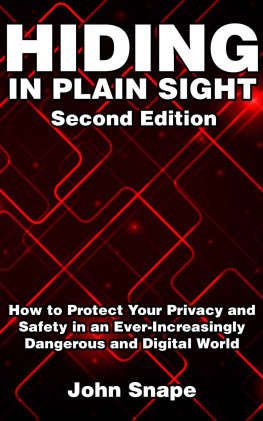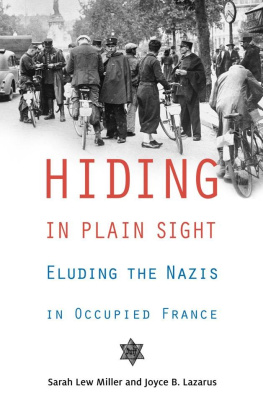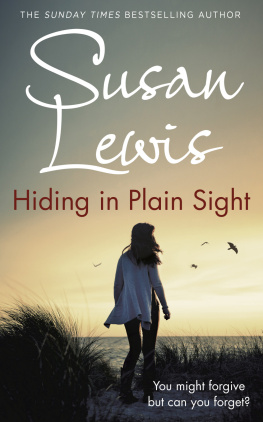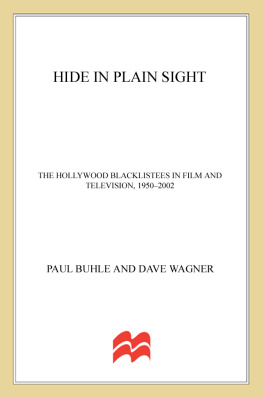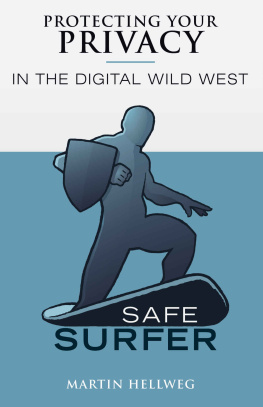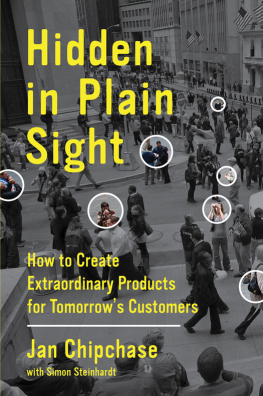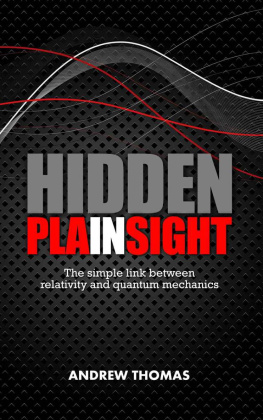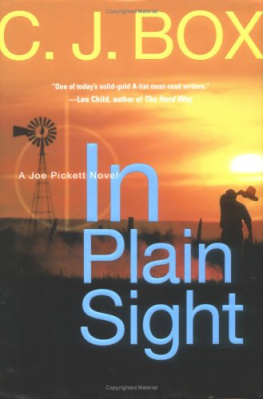Hiding in Plain Sight
How to Protect Your Privacy and Safety in an Ever-Increasingly Dangerous and Digital World
Second Edition
John Snape
Copyright 2018 by John Snape.
All rights reserved. No part of this publication may be reproduced, distributed, or transmitted in any form or by any means, including photocopying, recording, or other electronic or mechanical methods, without the prior written permission of the publisher, except in the case of brief quotations embodied in critical reviews and certain other noncommercial uses permitted by copyright law.
Print Edition ISBN 978-0-359-32046-2
For permission requests, write to the publisher, addressed Attention: Permissions Coordinator, at the address below.
Snape Legal Publishing
1183 E Main St D
El Cajon, CA 92021
john@johnsnape.com
Ordering Information:
Quantity sales. Special discounts are available on quantity purchases by corporations, associations, and others. For details, contact the publisher at the address above.
All trademarks used in this book are property of their respective owners. No endorsement of this book by the trademark holders is express or implied by their inclusion.
Contents
Preface
All human beings have three lives: public, private, and secret. Gabriel Garca Mrquez
Note: I am not your lawyer, and never will be, and any and all advice I give in this book is without warranty as to its fitness for use in your life or situation and does not create an attorney-client connection between us. Consult an attorney if you have questions about the legality or efficacy of anything written in this book.
I disclaim all responsibility for your inability to verify or confirm anything in this book.
This is the second edition of Hiding in Plain Sight . Ive re-arranged, modified and updated almost everything from the first edition. Im starting this new edition just a few days after publishing the first. Why? Well, for two main reasons: one, Im the type of person that needs to be creating, and as an author, I just had to write more (s urprise! ); and two, there are so many things you can do to protect your privacy and security, and I touched on just a handful in the first edition.
All the information presented here is valid as of publication. I wont make that claim if youre reading this even a few years from publication. I do plan on writing updated editions in the future when time allows it and necessity deems it.
Always check with a lawyer or other knowledgeable person before implementing any information found in this book.
Your Pledge
Hiding in Plain Sight is an iterative process, with each advancement allowing you to gain an ever-increasing amount of privacy. There are quite a few things youve always done that will have to be unlearned. Giving out your home address is the first item on the list. If people dont know where you live, they cant find you to do you physical, or other, harm.
Youll also have to decide to never be completely truthful to anyone outside of your immediate family. Common activities like keeping your cell phone powered on all the time, giving out your Social Security or drivers license number, or paying by personal credit card will suddenly become verboten .
This pledge also applies to your spouse and children. Even if you keep this information secret, one of them might expose it. They have to be on-board or it will be ineffective at best, deadly at worst.
Keeping yourself, and your family, safe is always the top priority. Even the police have no duty whatsoever to keep you safe. The Supreme Court has said as much in DeShaney v. Winnebago County Department of Social Services , where the court reasoned, Nothing in the language of the Due Process Clause itself requires the State to protect the life, liberty, and property of its citizens against invasion by private actors, said Chief Justice Rehnquist for the majority, even where such aid may be necessary to secure life, liberty, or property interests of which the government itself may not deprive the individual without due process of the law.
What is Judgment Proof?
When dealing with privacy, the ultimate goal should be making yourself look judgment proof. If it looks like you have no property, no home, and no chance of paying out to lawyers (you have whats called shallow pockets ), they will ignore you and head to someone with deeper pockets.
What is Functionally Invisible?
When dealing with security, the ultimate goal should be making yourself look functionally invisible . Who do you think will be at greater threat of being robbed: the guy in expensive clothes who is tossing cash around like its going out of style, or the guy in non-descript clothing who is quiet and unassuming? Your goal is to do what good spies do: blend into a crowd of one. If no one remembers even seeing you, youve accomplished your goal.
Threat Modeling, aka Do I Really Need to Do all of This?
Threat Modeling is a term used by professionals to get a grip on what, if any, steps you need to take to protect yourself from bad actors. There are five questions to ask yourself (courtesy of the Electronic Frontier Foundation ):
What do you want to protect?
Who do you want to protect it from?
How likely is it that you will need to protect it?
How bad are the consequences if you fail?
How much trouble are you willing to go through in order to try to prevent those?
Answering these questions will give you a starting point for setting up a plan you and your family can use to insulate yourselves from danger and deceit. The threat modeling for parents trying to keep their kids from accessing Netflix when theyre not home is vastly different from the threat modeling for a journalist in a hostile, authoritarian country trying to report human rights abuses by that same government.
Take some time to sit down and write out what youre trying to protect. Knowing what you must protect, as well as what youd like to protect, will go a long way in setting up your personalized plan of action. There really is no reason to plan for things that are unlikely or impossible to happen. Thats just wasted effort.
Chapter One: Thinking and Acting with a Privacy Mindset
The way things are supposed to work is that were supposed to know virtually everything about what they [the government] do: thats why theyre called public servants. Theyre supposed to know virtually nothing about what we do: thats why were called private individuals. Glenn Greenwald
There are some general things you can do to protect your privacy, and thats what this chapter is about: the philosophy of privacy. Youll need to adopt a mindset that says your personal life is no ones business. It might be difficult in the beginning, since humans are social beings, and sharing our lives with others helps bring cohesion to society. Youll have to train yourself, and your family, that you can be social without compromising your familial privacy.
Separating You from Your Home Address
The biggest and best way to protect yourself is to separate you and your family from your home address. Not physically separating yourself from your home, but informationally separating yourself. In other words: dont let anyone know where, exactly, you live. Keeping others from knowing where you live is imperative to staying safe. Knowing that the guy attempting to deliver a package, or the service man in a fake uniform at the door, or even something as innocuous as a pizza delivery, is out of place and indicative of someone trying to harm you.
Having nothing coming to your home is a process that might take a while (depending on how many people and businesses have your address) but is essential to protecting you and your family.

